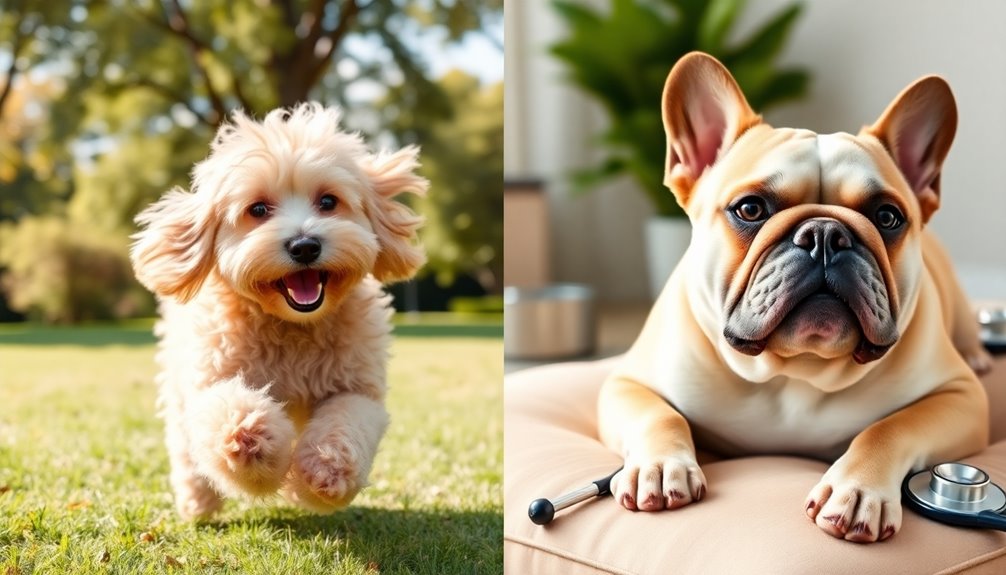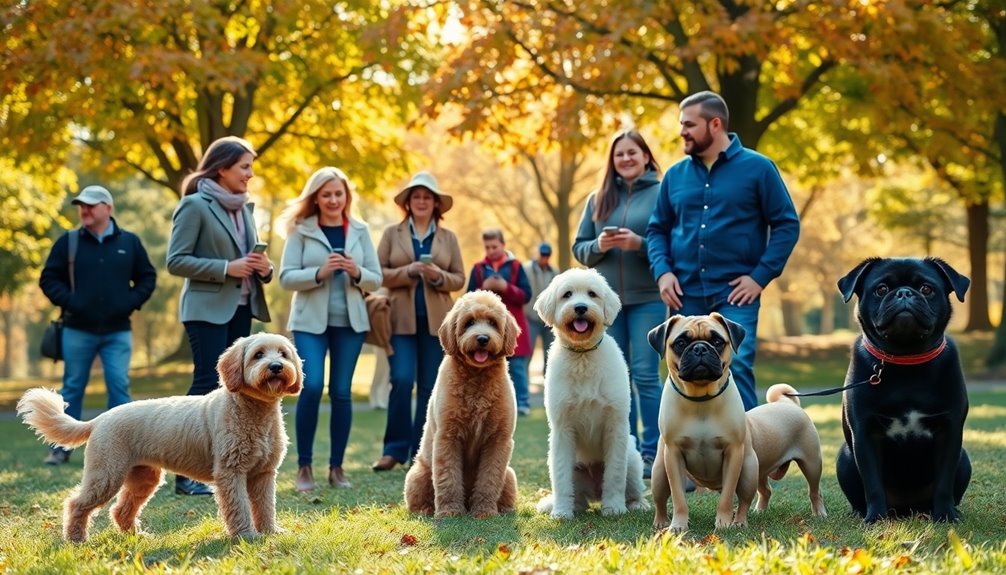Designer breeds offer a mixed bag of benefits and drawbacks. On the plus side, they often enjoy hybrid vigor, leading to fewer health issues and unique temperaments that can make them great companions. However, you should be aware of the high costs and unpredictability in traits, which can lead to unmet expectations. There are also ethical concerns around breeding practices and the potential for inherited health issues. Plus, with so many dogs in shelters, choosing a designer breed can contribute to overpopulation. Keep exploring to uncover more nuances about these trendy pups and their alternatives.
Key Takeaways
- Designer breeds offer hybrid vigor, potentially leading to fewer inherited health issues and a longer lifespan compared to purebred dogs.
- They can be friendly and adaptable companions, with unique temperament traits that suit various lifestyles.
- High purchase prices and inconsistent traits may lead to unmet expectations for prospective owners of designer breeds.
- Ethical concerns arise from puppy mills and lack of formal registries, complicating health verification for designer dogs.
- Adopting mixed-breed dogs from shelters provides a healthy, cost-effective alternative while addressing pet overpopulation issues.
Top picks for "truth about designer"
Open Amazon search results for this keyword.
As an affiliate, we earn on qualifying purchases.
Definition of Designer Breeds

Designer breeds refer to hybrid dogs created by intentionally crossing two purebred breeds, resulting in a mix that combines desirable traits from each parent. A popular example is the Goldendoodle, which blends the friendly nature of the Golden Retriever with the intelligence of the Poodle.
While designer dogs often attract attention for their unique appearances and characteristics, it's crucial to note that they aren't recognized as official breeds by major kennel clubs. This sets them apart from purebreds, which have standardized traits, lineage, and specific breed standards.
The term "designer dog" rose to fame in the 1990s, with the Labradoodle frequently mentioned as one of the first notable hybrid breeds.
You might find that many designer breeds are marketed for particular traits, such as hypoallergenic coats or minimal shedding, appealing to various dog owners with specific needs.
However, the genetic variability in hybrid dogs can lead to a wide range of appearances and temperaments in their offspring, which may not always align with the expected traits of their purebred parents.
Understanding these distinctions is crucial when considering adding a designer breed to your family.
Benefits of Designer Dogs

When you consider designer dogs, you'll find a range of health benefits due to hybrid vigor, which often leads to fewer inherited health issues.
Many of these breeds also boast unique temperament traits, making them friendly and adaptable companions.
Plus, with so many options available, you can easily find a pup that fits your lifestyle, whether you want a small travel buddy or a larger family dog.
Health Benefits of Hybrids
Hybrid vigor is one of the most compelling reasons to contemplate designer dogs for your household. When you choose a hybrid, you're tapping into a diverse gene pool that markedly boosts health benefits and longevity compared to purebreds.
Here are some key advantages:
- Reduced genetic problems: Mixing breeds lowers the chances of inherited disorders, as the diverse genetics help minimize recessive health issues.
- Improved longevity: Designer dogs often enjoy longer lifespans, typically ranging from 10 to 15 years, thanks to their hybrid vigor.
- Fewer health complications: Certain combinations can alleviate breed-related health issues, like respiratory problems in flat-faced purebreds, making hybrids a healthier option.
- Desirable traits: Many designer breeds are developed for specific characteristics, such as hypoallergenic coats, making them suitable for allergy sufferers.
Unique Temperament Traits
The temperament of designer dogs often reflects the best traits of their parent breeds, creating companions that aren't only affectionate but also adaptable.
Thanks to hybrid vigor, these designer dog breeds tend to exhibit improved health and balanced temperament traits compared to their purebred counterparts. This means you're more likely to find a dog that's friendly, social, and well-suited to family life.
For instance, Goldendoodles combine the intelligence of Poodles with the friendly nature of Golden Retrievers, making them excellent companions for families and individuals alike.
The intentional breeding of designer dogs aims to merge desirable qualities, leading to lower aggression levels and enhanced trainability.
Moreover, the diverse gene pool in designer breeds offers a wider range of temperament traits, which can help you find a dog that perfectly matches your lifestyle and preferences.
If you have allergies, certain designer breeds are also specifically bred to be hypoallergenic, allowing allergy sufferers to enjoy the joys of dog ownership without discomfort. Additionally, the positive emotional support provided by these dogs can enhance your overall well-being, contributing to a higher vibrational energy in your life.
Variety of Options
Designer dogs offer a remarkable variety of options that cater to different preferences and lifestyles. With over 200 hybrid combinations, you can find the perfect companion that fits your needs.
These delightful mixes are the offspring of two purebred dogs, bringing together the best traits of each breed. Here are a few benefits of choosing designer dog breeds:
- Desirable Traits: Many designer breeds, like Goldendoodles and Labradoodles, are bred for specific characteristics, such as low-shedding coats. This makes them ideal for allergy sufferers or those who prefer less grooming.
- Hybrid Vigor: The combination of two purebred dogs can lead to healthier offspring, often resulting in fewer inherited genetic defects. This means a longer, healthier life for your furry friend.
- Varied Sizes: Designer dogs come in various sizes, which allows you to choose one that fits your living situation—whether you're in a small apartment or a spacious home.
- Unique Temperaments: With diverse personality traits, designer dogs can suit different lifestyles, whether you need an energetic playmate or a calm companion.
- Additionally, many designer breeds, like the Dalmadoodle, combine intelligence and playful nature, making them great companions for families.
Ultimately, the variety of options available makes designer dogs an appealing choice for many pet owners.
Drawbacks of Designer Dogs

Purchasing a designer dog often comes with a hefty price tag, which can start around $700 and soar past $2,000. This high cost is driven by demand and selective breeding practices, but it raises questions about value. The lack of formal registries for these breeds makes it tough for you to verify the lineage and health quality of your new pet.
You might find that the inconsistent traits among designer dogs lead to disappointment, as hybrid offspring may not resemble the characteristics you expected from their parent breeds.
Moreover, health issues can arise from recessive traits in the parent breeds, leaving your designer dog susceptible to genetic problems despite the touted hybrid vigor.
Unfortunately, the surge in popularity has also fueled unethical practices among some designer dog breeders, who prioritize profits over the animals' health and well-being. This can mean that your new furry friend may come from puppy mills, where conditions are often poor and breeding is done irresponsibly.
In short, while designer dogs can be appealing, the potential drawbacks and hidden costs are significant to evaluate before making a decision.
Designer Dogs and Animal Shelters

Adopting a dog from a shelter not only saves a life but also helps combat the growing issue of pet overpopulation. With approximately 3.1 million dogs in U.S. shelters and only around 2 million adopted each year, the situation is dire.
The increasing trend toward designer dogs diverts attention from these lovable shelter animals, many of which have similar traits to popular hybrids.
Here's why you should consider adoption:
- Cost-effective: Shelters often charge considerably lower fees than what you'd pay for a designer dog.
- Unique hybrids: Many shelters have hybrid dogs available, offering the best of both worlds without the hefty price tag.
- Saving lives: By adopting, you directly combat the staggering 390,000 dogs euthanized annually due to space limitations.
- Community impact: Your choice to adopt reduces the demand for designer dogs and helps tackle unethical breeding practices.
- Health considerations: Many shelter dogs have been monitored for health issues, ensuring that you bring home a pet with fewer immediate concerns.
When you choose adoption, you're not just gaining a new friend; you're also making a positive impact on the lives of countless animals in need.
Ethical Breeder Selection

Choosing the right source for your new puppy plays a significant role in ensuring a happy and healthy addition to your family. When considering ethical breeder selection, it's important to verify their reputation and practices. Look for referrals, reviews, and visit their breeding environment.
| Criteria | Ethical Breeder |
|---|---|
| Health Testing Records | Provides for both parent breeds |
| Living Conditions | Clean, safe, and spacious |
| Interaction with Parents | Encourages meetings |
| Litter Size | Limited, focusing on quality |
Reputable breeders should provide health testing records to screen for known genetic disorders, which is essential for promoting the health of your puppy. When you visit the facility, assess the living conditions and care of the dogs. Meeting the puppy's parents offers insight into their temperament and lineage health. Remember, responsible breeders focus on quality rather than quantity, often having a limited number of litters per year. By choosing an ethical breeder, you're more likely to welcome a well-adjusted puppy into your home, which is a significant step in enjoying the joys of designer breeds. Additionally, understanding the importance of health testing records can help ensure that you are making an informed decision in your puppy selection process.
Health Considerations for Designer Breeds

When it comes to the health of designer breeds, understanding their unique genetic backgrounds is essential.
These hybrid dogs can enjoy hybrid vigor, which often results in fewer inherited health problems compared to purebreds. However, that doesn't mean they're immune to health issues. They can still inherit recessive genetic disorders from their parent breeds.
Here are some key health considerations for designer breeds:
- Research Parent Breeds: Investigate the specific health risks associated with the breeds involved. This helps you identify potential hereditary issues.
- Unpredictable Health Outcomes: The variability in traits may lead to some hybrids facing severe health challenges, similar to those in purebreds.
- Regular Check-Ups: Schedule consistent veterinary visits to monitor your dog's health and catch any issues early.
- Genetic Testing: Consider genetic testing to detect potential health risks, allowing for proactive management and care. Additionally, be aware that certain foods, such as grapes, can be toxic to dogs, highlighting the importance of knowing toxic foods for dogs in maintaining their health.
Market Trends in Dog Ownership

The rising interest in designer dog breeds reflects broader market trends in dog ownership today. More and more people are drawn to the unique combinations and desirable traits these dogs offer. As a result, you'll find many designer breeds priced at $2,000 or more, highlighting their growing appeal.
However, this trend has a darker side. Approximately 3.1 million dogs sit in shelters across the U.S., yet only about 2 million get adopted each year. This gap illustrates a troubling preference for designer dogs over mixed breeds.
The increasing demand for designer breeds has also led to unethical breeding practices, particularly in puppy mills, where profit often trumps the health of the animals. While these dogs are marketed as fashionable and trendy, it's vital to reflect on the implications of such breeding.
Many potential owners seek hypoallergenic options or perceive designer breeds as healthier alternatives to purebreds, especially given rising awareness of health issues in traditional breeds. As you navigate this landscape, it's important to evaluate the allure of designer dogs against the ethical considerations and the ongoing plight of shelter animals. Additionally, it is crucial to understand that some designer breeds may still inherit health issues from their purebred lineage, which can lead to significant veterinary costs.
Alternatives to Designer Breeds

Adopting a dog from an animal shelter offers a compassionate and cost-effective alternative to purchasing a designer breed. You can find wonderful mixed-breed dogs that come at a fraction of the price, typically ranging from $50 to $200.
Here are some great reasons to take into account shelter dogs over designer breeds:
- Hybrid Vigor: Many mixed-breed dogs often exhibit hybrid vigor, leading to fewer inherited health issues compared to purebreds.
- Cost Savings: Adopting a shelter dog saves you money, allowing you to invest in quality care and supplies instead.
- Variety of Choices: Rescue organizations frequently have hybrid dogs that possess similar traits to popular designer breeds, so you can find a pup that fits your lifestyle.
- Combatting Puppy Mills: By choosing to adopt, you help combat unethical breeding practices and reduce the significant number of dogs—approximately 3.1 million—currently residing in shelters.
Additionally, many seniors find that texting humor enhances their bond with adopted dogs, making the experience even more enjoyable.
When you adopt, you not only gain a loyal companion but also make a positive impact on your community.
Shelter dogs deserve a loving home, and by choosing them, you're making a responsible choice.
Frequently Asked Questions
Is It Ethical to Breed Designer Dogs?
Breeding designer dogs raises ethical concerns.
You should consider the welfare of the animals involved and the implications of supporting practices that prioritize profit over health.
With millions of dogs in shelters needing homes, it's hard to justify breeding when there are so many mixed-breed dogs waiting for a family.
If you're thinking about getting a dog, adopting from a shelter is often the more ethical choice that promotes responsible pet ownership.
What Breed of Dog Do Vets Not Recommend?
Vets often don't recommend brachycephalic breeds like Bulldogs and Pugs due to their severe respiratory issues caused by short snouts.
Large breeds, such as Great Danes, can also be problematic, as they're prone to serious conditions like bloat and hip dysplasia.
If you're considering a designer breed, be cautious; they can inherit health problems from both parent breeds, leading to significant risks for your furry friend's well-being.
Does AKC Recognize Designer Breeds?
You might think designer breeds are the rock stars of the dog world, but the AKC doesn't recognize them at all.
They focus solely on purebred dogs that adhere to specific standards. While you can find mixed breeds in their Canine Partners program, designer breeds don't qualify.
Some alternative registries might accept them, but without major kennel club oversight, you should be cautious about breeding practices and health issues.
What Are the Advantages of Designer Dogs?
Designer dogs offer several advantages you might appreciate.
They often benefit from hybrid vigor, meaning they're generally healthier than purebreds. If you have allergies, many designer breeds are marketed as hypoallergenic, making them great companions for allergy sufferers.
You'll also find a combination of desirable traits, such as intelligence and temperament, tailored to your lifestyle. Plus, with over 200 combinations, you can choose a dog that fits your preferences perfectly.
Conclusion
In the grand tapestry of dog ownership, designer breeds might seem like the glittering jewels, but don't be fooled! While they can be adorable companions, their allure often masks a tangled web of ethical dilemmas and health risks. You'll want to think twice before diving into this trend. Instead, consider the countless lovable pups in shelters just waiting for a home. Sometimes, true love doesn't come with a designer label; it comes with a wagging tail and a heart full of gratitude!










